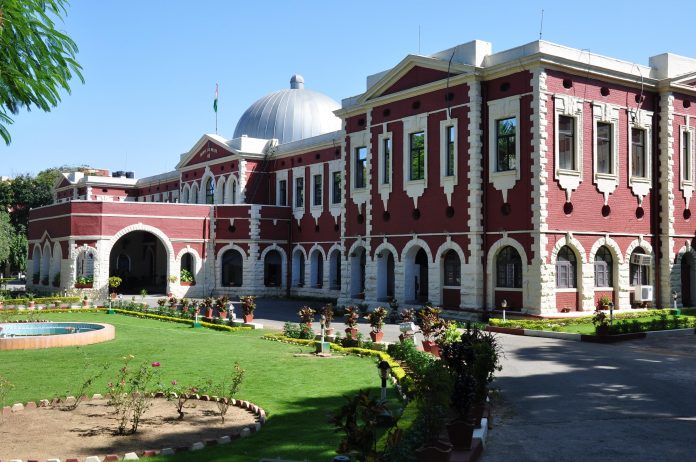The Jharkhand High Court imposed a cost of Rs. 25,000/- on the Petitioner and dismissed a Public Interest Litigation (PIL) filed seeking direction to make enquiry/investigation regarding the alleged high level corruption in the admission in M.B.B.S. courses conducted by the Jharkhand Combined Entrance Competitive Examination Board .
The Petitioner alleged that due to the connivance of the Private Secretary to the then Health Minister and Secretary by contravening provision of Section 57 of the Right of Persons with Disabilities Act, 2016 and Resolution Dated 03.04.2018 , of the Department of Personnel and Administrative Reforms and Rajbhasha Department, which provides that only those certificates regarding disability of persons issued by the authorities notified by the State of Jharkhand are eligible and valid for taking admissions in M.B.B.S. course and other courses.
While considering the PIL , the Division Bench of Chief Justice Sanjaya Kumar Mishra and Justice Ananda Sen said that first of all, the petitioner appears to be a busy body filing several Public Interest Litigations without any valid or reliable credentials in his favour. Thus, relying upon the Rules 4 and 5 of the Jharkhand High Court (Public Interest Litigation) Rules, 2010 and the ratio decided by the Supreme in the case of State of Jharkhand Vs. Shiv Shankar Sharma and others, 2022 SCC OnLine SC 1541, the Court is of the view that the Public Interest Litigation should not be entertained.
On the merit also, it is brought to the notice of the Court that the private respondents have taken admission in Medical Colleges under the Central Quota. It is not disputed that they have produced physical disability certificates issued from the authorities outside the State of Jharkhand.
Section 56 appearing in Chapter X of The Rights of Persons with Disabilities Act, 2016 provides that the Central Government shall notify guidelines for the purposes of assessing the extent of specified disability in a person. This Clause seeks to empower the Central Government to notify guidelines for assessment of specified disabilities.
Section 57 provides designation of certifying authorities. Subsection (1) of Section 57 provides that the appropriate Government shall designate persons, having requisite qualifications and experience, as certifying authorities, who shall be competent to issue the certificate of disability. Sub-section (2) provides that the appropriate Government shall also notify the jurisdiction within which the terms and conditions subject to which the certifying authority shall perform its certification functions. In Notes of Clauses, it is clarified that this clause seeks the appropriate Government to designate certifying authorities for the purposes of issuance of certificate of disability.
On joint reading of both the Sections leaves no doubt in the mind of the Court that the Central Act, i.e., Rights of Persons with Disabilities Act, 2016, does not make any distinction between certificates issued by authorities in one State or the other. The relevant aspect that has to be considered by the High Court is whether the guidelines for assessment have been followed or not and whether the designated authority has been duly authorized by the appropriate Government. In this case, it is not the case of the petitioner that the guidelines for assessment of specified disabilities have not been followed. It is also not the case of the petitioner that the appropriate Government has not designated the authorities who have issued the certificates. Moreover, Section 58 provides for procedures for certification.
Sub-section (3) of Section 58 further provides that the certificate of disability issued under this section shall be valid across the country. The Act further provides that this Clause seeks to provide for the procedure for issuance of certificate of disability to any person with specified disability.
Interpreting the Clause 10 of the Resolution of the State Government issued on 03.04.2018 by the State Government, the counsel Rajeev Kumar, for the petitioner submitted that only those persons who have obtained disability certificate from designated authority in the State of Jharkhand can avail the benefit of reservation and those persons who have obtained certificate of disability from any authorized persons outside the State shall not be allowed to participate in the selection process by availing reservation for physically disabled persons.
The Bench is not in agreement with the submissions made by the counsel for the petitioner, as, a plain reading of aforesaid Clause 10 does not provide that actually only the authorities designated for the State of Jharkhand can provide a valid certificate to be considered for the purpose of obtaining admission by admitting through the reservation provided for physically challenged persons.
In this case, the private respondents have participated in the selection process and have taken admission in the years 2011 to 2013 and the Public Interest Litigation has been filed in the year 2020, i.e., almost after 7 to 9 years of their taking admission.
“It appears to us that the petitioner has an oblique and ulterior motive in filing this writ petition. In that view of the matter, we are inclined to impose a cost of Rs. 25,000/- (Rupees twenty five thousand only) on the petitioner for filing frivolous Public Interest Litigation without having any credibility or credential in his favour. The cost of Rs. 25,000/- (Rupees twenty five thousand only) should be deposited in the coffers of the Jharkhand State Legal Services Authority within a period of 30 days, failing which the same shall be recovered from the petitioner as arrears of land revenue under the Bihar and Orissa Public Demand Recovery Act, 1914”, the order reads.


